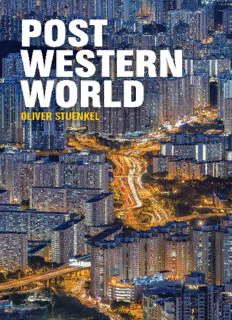
Post-Western World: How Emerging Powers Are Remaking Global Order PDF
Preview Post-Western World: How Emerging Powers Are Remaking Global Order
Post-Western World Post-Western World How Emerging Powers Are Remaking Global Order Oliver Stuenkel polity Copyright © Oliver Stuenkel 2016 The right of Oliver Stuenkel to be identified as Author of this Work has been asserted in accordance with the UK Copyright, Designs and Patents Act 1988. First published in 2016 by Polity Press Polity Press 65 Bridge Street Cambridge CB2 1UR, UK Polity Press 350 Main Street Malden, MA 02148, USA All rights reserved. Except for the quotation of short passages for the purpose of criticism and review, no part of this publication may be reproduced, stored in a retrieval system, or transmitted, in any form or by any means, electronic, mechanical, photocopying, recording or otherwise, without the prior permission of the publisher. ISBN-13: 978-1-5095-0456-5 ISBN-13: 978-1-5095-0457-2(pb) A catalogue record for this book is available from the British Library. Library of Congress Cataloging-in-Publication Data Names: Stuenkel, Oliver, author. Title: Post-western world : how emerging powers are remaking global order / Oliver Stuenkel. Description: Malden, MA : Polity Press, 2016. | Includes bibliographical references and index. Identifiers: LCCN 2016005450| ISBN 9781509504565 (hardcover : alk. paper) | Typeset in 11 on 13 pt Sabon by Toppan Best-set Premedia Limited Printed and bound in the UK by Clays Ltd, St. Ives PLC The publisher has used its best endeavours to ensure that the URLs for external websites referred to in this book are correct and active at the time of going to press. However, the publisher has no responsibility for the websites and can make no guarantee that a site will remain live or that the content is or will remain appropriate. Every effort has been made to trace all copyright holders, but if any have been inadvertently overlooked the publisher will be pleased to include any necessary credits in any subsequent reprint or edition. For further information on Polity, visit our website: politybooks.com Contents Maps, graphs, and tables vi Acknowledgments viii Introduction 1 1. The Birth of Western-Centrism 29 2. Power Shifts and the Rise of the Rest 63 3. The Future of Soft Power 97 4. Toward a Parallel Order: Finance, Trade, and Investment 120 5. Toward a Parallel Order: Security, Diplomacy, and Infrastructure 154 6. Post-Western World 181 Conclusion 195 Notes 206 Index 239 Maps, graphs, and tables Maps 0.1 Mercator map 12 0.2 Hobo Dyer projection 13 0.3 Hobo Dyer projection / “South map” 14 5.1 The New Silk Road 169 Graphs 0.1 World’s largest three economies, GDP at PPP as percent of world total; historical output within the boundaries of modern countries 4 1.1 The world’s three largest economies in 1820, in PPP 38 2.1 The Western blip: US and Chinese share of global GDP (PPP) 67 2.2 Population share in 2050 78 2.3 The biggest contributors to global growth. 80 4.1 Capital stock in the AIIB 126 Tables 4.1 The Parallel Order: Finance 122 4.2 The Parallel Order: Trade and Investment 122 4.3 The Parallel Order: Security 123 4.4 The Parallel Order: Diplomacy 123 4.5 The Parallel Order: Infrastructure 123 5.1 Intra-BRICS Cooperation, Main Areas 165 Acknowledgments I would like to thank my undergraduate, graduate, and executive students at Fundação Getulio Vargas (FGV) in São Paulo and Rio de Janeiro, as well as the many exchange students from all over the world who greatly contributed to this book through their comments and critiques during our discussions. Special thanks go to Amitav Acharya for his support. This book would not have come to fruition without him. In the same way, the encouragement of Louise Knight and Nekane Tanaka Galdos of Polity Press was crucial through- out the writing process. Over the past year, I have been able to discuss the ideas here exposed in a variety of settings, and I thank Sumit Ganguly at the University of Indiana in Bloomington for inviting me for a great discussion. Raffaele Marchetti was a wonderful host during my time as a visiting professor at Libera Università Internazionale degli Studi Sociali Guido Carli (LUISS) in Rome, where I had time to write and present my research. Renato Baumann of the Institute of Applied Economic Research (IPEA) in Brasília kindly asked me to be part of the Brazilian delegation to the BRICS Academic Forum in Moscow, where I had the
Description: